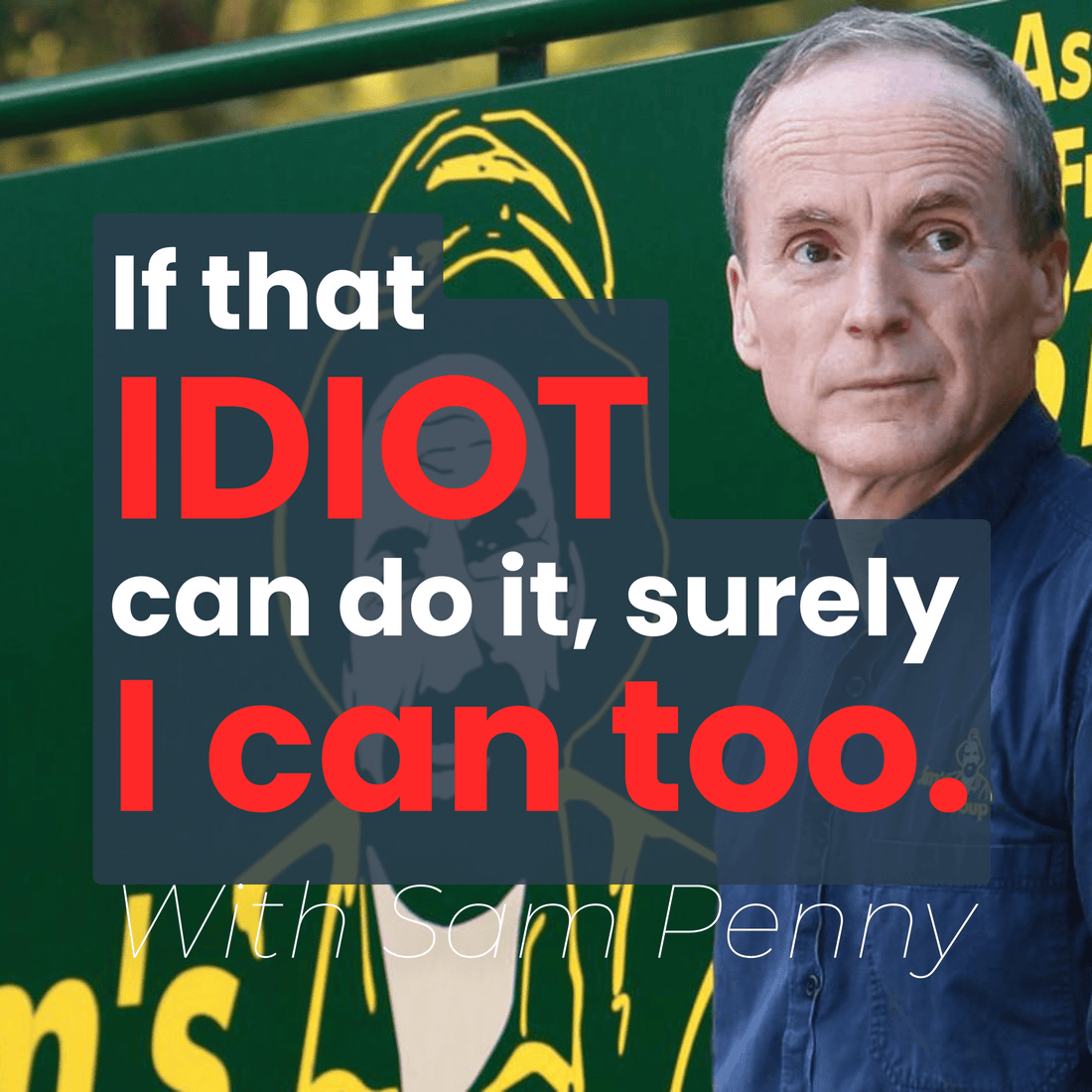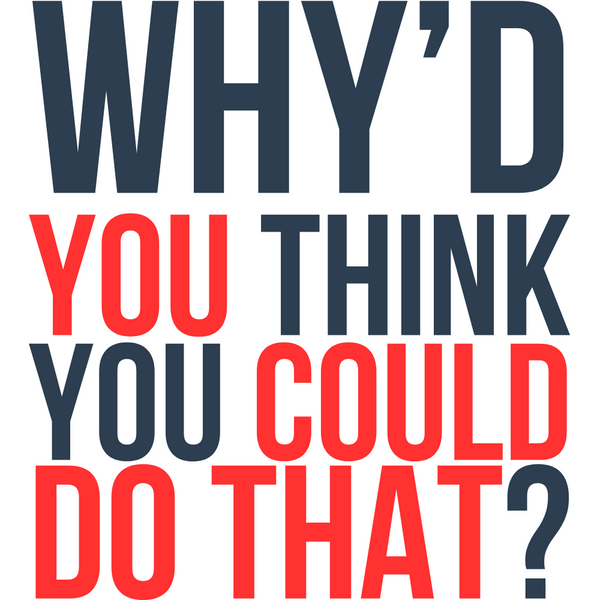
More than a Man with a Mower: How Jim Penman is Trying to Change The World
Share
Podcast — Why’d You Think You Could Do That?
Most Australians know the brand. Fewer know the mission. In this episode, Sam Penny speaks with the founder of Jim’s Group about building an iconic franchise by putting operators first, and why the business was always a means to fund deeper scientific work on character, society and long-term prosperity.
Watch below, or listen on Apple Podcasts and Spotify. Explore all episodes on the podcast page. If you’d like Sam personally in your corner, apply for coaching at sampenny.com/action.
- The Big Idea
- Early Life & Mismatch with Academia
- Rock Bottom & the $24 Mower
- Craft, Pride & Customer Obsession
- From Rounds to Franchise
- Franchisee-First Values
- Scale, Demand & New Divisions
- Biohistory, Epigenetics & Character
- Controversy & Open Questions
- AI, Work & the Next Decade
- Family, Cost & a Life of Purpose
- Playbook for Owners & Buyers
- Memorable Quotes
- Chapters & Timestamps
- Listen Anywhere
- Work with Sam
The Big Idea
When people hear “Jim’s”, they picture the trailers, the uniforms and a familiar green-and-yellow brand. Underneath the public image sits a bigger, more personal drive: to understand why some societies thrive while others stagnate, and to test whether character can be strengthened in ways that improve lives at scale. The business was the funding model; the mission was always larger than lawns.
“Mowing lawns wasn’t the mission. It was just the way to fund the mission.”
Early Life & Mismatch with Academia
As a kid he devoured books—history, biology, science fiction—drawn less to dates and more to patterns. At university that instinct intensified: not “what happened?” but “why do civilisations rise, plateau and fall?” That framing clashed with a historical discipline geared toward micro-specialisation. A broad, systems-level thesis was rejected, and the door to academia closed—for a time.
The rejection didn’t kill the questions. It simply changed the route to answering them.
Rock Bottom & the $24 Mower
With debt, a failed academic pathway and a family starting out, he turned back to what he knew: outdoor work. The tools were basic—a second-hand mower—and the goal was simple: do the job exceptionally well, get paid, do the next one. Manual work wasn’t a compromise; he genuinely enjoyed being outside in the cold air, moving, creating visible order from chaos.
That season forged habits that would later underpin the brand: reliability, straight lines, clean edges, and the internal standard that a job is done when it looks right, not when the clock says so.
Craft, Pride & Customer Obsession
The hallmark of the early days was craft. A single blade of grass left proud on an edge wasn’t a small thing—it was emotionally offensive. That craft lens bled into operations: how to mow faster without mess, how to load and unload better, how to schedule more efficiently, how to communicate clearly with customers so there were no surprises.
The result was a compounding loop: meticulous work drove word-of-mouth; word-of-mouth created overflow; overflow forced experiments with helpers and subbies; those experiments sparked questions about standards, training and accountability. Quietly, a system was forming.
From Rounds to Franchise
Selling lawn-mowing rounds created short-term cash but no enduring asset. When a large interstate competitor arrived, he studied their franchise model carefully—what worked, what angered operators, what rules protected the brand but harmed the people doing the work. He concluded a different contract could do both: protect the customer experience and tilt power toward the franchisee.
The first iteration launched in 1989. Expectations were modest—maybe a hundred franchisees if things went well. The edge wasn’t glossy marketing; it was trust engineered into the system. He fought for clauses lawyers called reckless at the time: strong renewal rights; veto power over manual changes; the ability for franchisees to move divisions or replace their franchisor; fair fees that didn’t punish success. The instinct was simple—build the business you’d want to join if you were the one on the tools.
Franchisee-First Values
The operating principle became clear: look after the operator and the operator will look after the customer. He screened applicants for service attitude and resilience, preferring to grow slower with the right people rather than faster with mismatches. Counter-intuitively, selectivity accelerated growth—prospective buyers phoned existing franchisees and heard consistent stories of support, fair rules and full diaries.
“I can cope with a tax bill. I can’t cope with a franchisee failing.”
Customer service processes were tough by design, not to punish, but to keep the bar high and the network’s reputation compounding. The philosophy: insist on standards, back franchisees with training and practical help, and take responsibility for difficult complaints until they are resolved.
Scale, Demand & New Divisions
From a single service the group expanded into dozens of divisions—gardening, cleaning, fencing, dog wash, maintenance and more—often because happy customers asked for reliable help in adjacent categories. Demand has routinely exceeded supply. Strong operators earn well above average wages while enjoying autonomy and time flexibility—appealing traits for many families.
Biohistory, Epigenetics & Character
The research agenda shadowed the business the whole way. The working hypothesis: long-run outcomes depend less on policies alone and more on the character composition of a population—habits around effort, restraint, family formation, mutual trust, stewardship and duty. Those traits are shaped by upbringing and culture, and may be influenced by epigenetic pathways—biological mechanisms that alter how genes are expressed without changing DNA.
If true, interventions that strengthen character could raise life satisfaction, reduce “deaths of despair”, and support democratic stability. The aim isn’t to replace education or economics; it’s to complement them with tools that work with human nature rather than against it.
Controversy & Open Questions
Big theories attract debate. Critics worry about over-extension or misinterpretation. Supporters argue that ignoring character produces well-intended programs that disappoint in the real world. The useful stance for practitioners is humility: test, measure, refine; invest in families and communities; build environments that reward contribution and responsibility; stay open to new evidence.
AI, Work & the Next Decade
On technology, the view is pragmatic. AI will continue to strip friction from admin: quoting, routing, bookings, reminders, cashflow and customer comms. Those gains should lift operator earnings and reduce no-shows. At the same time, end-to-end automation of hands-on, variable site work remains hard. Until humanoid robotics handle edge-trimming, weeding, seasonal judgement, safety and face-to-face communication, skilled trades will remain resilient.
Family, Cost & a Life of Purpose
Building at scale extracts a price—time, energy, hard calls. Through it all he kept a bright line around parenting. Happiness, for him, emerges from purpose: family, the success of franchisees, and the possibility that good science can make life better for the next generation.
“Live a life of purpose.”
A Practical Playbook for Owners & Buyers
For owners preparing to sell:
- Codify the craft. Document standards so the experience doesn’t depend on any single person.
- Protect the frontline. Systems that make operators’ lives easier (fair contracts, predictable fees, strong renewal rights) create durable reputation and higher multiples.
- Prove demand. Track and share lead volumes, conversion, retention and NPS by segment. Unserviced demand is an asset.
- Institutionalise training. Make it repeatable: onboarding checklists, shadow runs, customer comms scripts, safety protocols.
- Replace heroics with process. Automate quoting, scheduling and reminders; create dashboards for franchisees and area managers.
For buyers and investors:
- Underwrite with character. Evaluate the operator pipeline and screening standards as closely as the P&L.
- Look for aligned incentives. Contracts that balance brand protection with operator autonomy tend to outperform.
- Check complaint pathways. Speed to resolution is a leading indicator of culture and future churn.
- Assess tech leverage. Booking, routing and payments automation compound small margins into meaningful gains.
Memorable Quotes
- “Mowing lawns wasn’t the mission. It was just the way to fund the mission.”
- “Character is destiny. Character is everything.”
- “I can’t accept a franchisee failing.”
- “Business is fun.”
- “If that idiot can do it, surely I can too.”
Chapters & Timestamps
Approximate chapter markers to help you jump around:
- 00:00 — Opening & set-up
- 01:27 — Early nerdy years; books over parties
- 02:44 — “I’m naturally lazy” and why school didn’t fit
- 05:07 — Systems view of history; cycles and patterns
- 07:49 — Thesis rejection and unorthodox ideas
- 10:15 — Demography, falling birth rates & long-run risk
- 14:17 — Rock bottom; debts; starting again with a mower
- 16:13 — Joy in manual work; outdoor life
- 18:18 — Iterating the business; speed, quality, training
- 20:39 — Franchising decisions; contracts that protect operators
- 23:43 — Core values; screening; why selectivity speeds growth
- 27:28 — Looking after franchisees before customers (and why that helps customers)
- 31:59 — Identity with independent tradespeople
- 33:00 — Purpose beyond profit
- 35:10 — Funding research; biohistory and epigenetics
- 39:12 — Academia vs empirical outcomes
- 42:41 — Unorthodox systems inside Jim’s
- 45:27 — Legacy & virtual Jim
- 46:04 — AI, efficiency and future-proof work
- 48:43 — The cost of building; boundaries around parenting
- 49:47 — Happiness, discontent and never settling
- 55:02 — Daily habits: cold showers, exercise, fasting
- 56:41 — Influential books; love of teaching
- 59:17 — What’s scary? Not business—family
- 1:00:24 — Where to find more
Listen Anywhere
- 🎧 Apple Podcasts: Why’d You Think You Could Do That?
- 🎧 Spotify: Why’d You Think You Could Do That?
- 📺 YouTube: Full video interview
- 📚 All episodes: sampenny.com/brave
Like this conversation? New episodes drop weekly. For founders and buyers who want structured accountability and deal support, apply for coaching with Sam at sampenny.com/action.
This article is based on a recorded, in-person conversation and a cleaned transcript. Quotations are taken from the interview and lightly edited for clarity.
